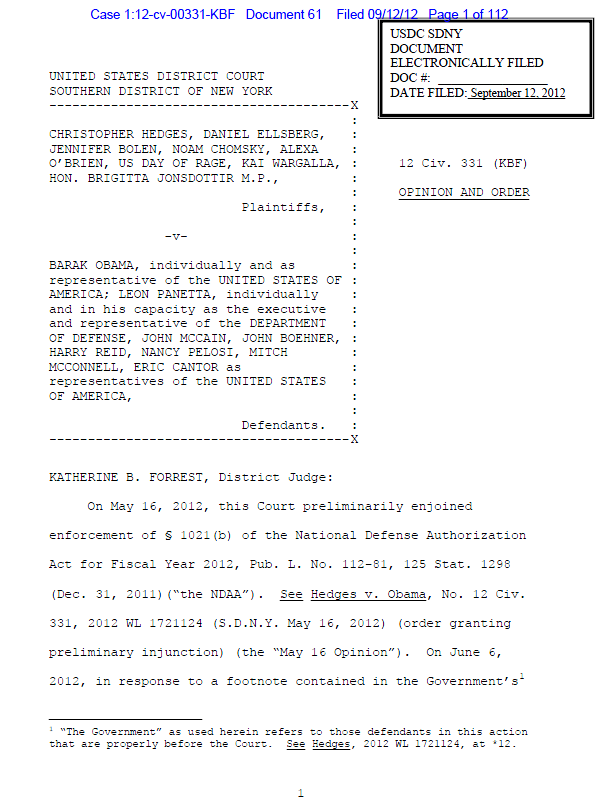Hedges v Obama Permanent Injunction
- 112 pages
- September 12, 2012
KATHERINE B. FORREST, District Judge:
On May 16, 2012, this Court preliminarily enjoined enforcement of § 1021(b) of the National Defense Authorization Act for Fiscal Year 2012, Pub. L. No. 112-81, 125 Stat. 1298 (Dec. 31, 2011)(“the NDAA”). See Hedges v. Obama, No. 12 Civ. 331, 2012 WL 1721124 (S.D.N.Y. May 16, 2012) (order granting preliminary injunction) (the “May 16 Opinion”). On June 6, 2012, in response to a footnote contained in the Government’s motion for reconsideration suggesting an unduly narrow interpretation of that ruling, this Court issued a summary order stating that the injunction was intended to–and did apply to–any and all enforcement of § 1021(b)(2), not simply to plaintiffs in this lawsuit.
On August 7, 2012, the Court held oral argument on the request for a permanent injunction (the “August hearing”). At the commencement of that argument, the Court confirmed that the parties agreed that the evidentiary record developed at the March 29, 2012, preliminary injunction hearing (the “March hearing”) would constitute the trial record for this matter. Hr’g Tr. of Oral Argument on Permanent Inj., Aug. 7, 2012 (Dkt. See Hedges v. Obama, No. 12 Civ. 331, 2012 WL 2044565, at *1 (S.D.N.Y. June 6, 2012) (summary order). On June 8, 2012, the parties agreed that neither side would seek to add to the evidentiary record presented in support of the preliminary injunction and that they would proceed directly to a hearing on plaintiffs’ request for a permanent injunction. (See Order (June 8, 2012) (Dkt. No. 43) at 1.) Accordingly, the parties submitted additional legal memoranda but no additional factual materials.
On August 7, 2012, the Court held oral argument on the request for a permanent injunction (the “August hearing”). At the commencement of that argument, the Court confirmed that the parties agreed that the evidentiary record developed at the March 29, 2012, preliminary injunction hearing (the “March hearing”) would constitute the trial record for this matter. Hr’g Tr. of Oral Argument on Permanent Inj., Aug. 7, 2012 (Dkt. No. 59) (“Tr. II”) at 3. The Court bases its findings of fact on that record.
For the reasons set forth below, this Court grants plaintiffs’ motion and permanently enjoins enforcement of § 1021(b)(2) of the NDAA (referred to herein as “§ 1021(b)(2)”).
…
The balance of the hardships also clearly weighs in plaintiffs’ favor. The Government already has ample authorization to pursue those actually involved in the attacks on September 11, 2001, and it has a host of criminal statutes (referred to above) that it can use to prosecute those who engage in a variety of activities that endanger lives or constitute terrorism. According to the Government, § 1021 is merely a reaffirmation of the AUMF–a position with which the Court disagrees. If, however, the Government is taken at its word, then enjoining its ability to enforce § 1021(b)(2) removes no tools from the Government’s arsenal. Most importantly, since Congress may pass no law abridging rights guaranteed by the First Amendment, enjoining enforcement of a statute that does just that cannot deprive Congress or the executive branch of that which they have no right to have.
The last element relates to the weighing of the public interest: does the public have a greater interest in preservation of its First Amendment and due process rights that are infringed by § 1021(b)(2), or in having the statute potentially available for use by law enforcement authorities? Here too, the fact that, according to the Government, § 1021(b)(2) adds nothing new to their authority, is decisive. Enjoining the statute will therefore not endanger the public. The Government did not put forward any evidence at trial that it needed the statute for law enforcement efforts; in contrast, plaintiffs did present evidence that First Amendment rights have already been harmed and will be harmed by the prospect of § 1021(b)(2) being enforced. The public has a strong and undoubted interest in the clear preservation of First and Fifth Amendment rights.

